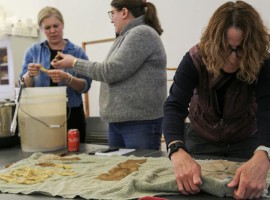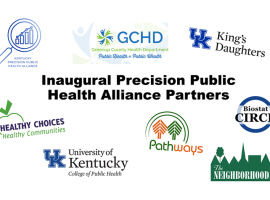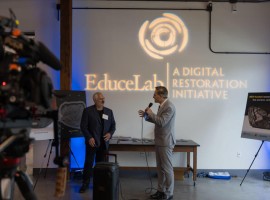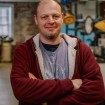Sally Ellingson Uses Big Data & Machine Learning to Improve Drug Development
From childhood excellence in art and math, Sally Ellingson has built a robust career in computational drug discovery. The graduate of joint program with the University of Tennessee and Oakridge National Laboratory, Ellingson is an assistant professor of biomedical informatics in the UK College of Medicine and manages high-performance computing for the UK Markey Cancer Center Cancer Research Informatics Shared Resource Facility.
A central aim of her research is to increase the accuracy of predicting whether or not a drug will bind to a protein, which is useful across the board of drug development.
“With machine learning, you can add biomedical big data sources into the drug development the process and use machine learning techniques to determine what factors are important to ultimately increase the prediction accuracy and efficiency,” Ellingson said.
Improving accuracy in drug development not only makes the process safer, but if it’s also significantly more efficient, Ellingson theorizes that it could help lower the cost of medications, thus improving access for the general population.
Soon after coming to UK, Ellingson received a KL2 Career Development Award from the UK Center for Clinical and Translational Science, which provides research funding and mentoring to support junior faculty in securing independent research awards.
“The KL2 has allowed me protected time to work on my particular area of interest, the research I’ve been developing since graduate school,” she said.
Mentorship was a significant aspect of Ellingson’s graduate student experience, and she now sees mentoring students among her primary responsibilities as a faculty member. In her lab she employs multiple graduate students from diverse training backgrounds, creating a complementary composite of expertise that catalyzes their work.
“I got a lot of encouragement along the way, and I like to do the same. It gives energy both ways,” she said.
She currently employs three computer science graduate students in her lab, none of whom had a background in biomedical informatics or health research.
“When I started working in her lab, I didn’t have much knowledge about biomedical informatics or computation biology," said Jeevith Bopaiah, a master’s student in computer science who works in Ellingson’s lab. "I just knew how to apply computer programs, and she was looking for someone with this knowledge to apply computer science techniques to the drug development domain. In her lab we’ve learned a lot about this domain and the biological aspects of proteins and the drugs, but we’ve also learned to think broadly about how to tweak computer science techniques to suit particular problems.”
Ellingson also has a co-appointment at UC Berkeley, where she has served as visiting faculty for the past two summers. While at Berkeley, she continues her research in collaboration with a computational chemistry lab, and she also mentors UK graduate students who she funds as summer lab interns. The research she conducted with her students at Berkeley two summers ago has already been published and presented at a conference in Switzerland.
Ellingson has also served in leadership roles for the annual Super Computing conference — this year she is chairing the student volunteer program, with a particular focus on engaging students from underrepresented backgrounds.
“People need to feel included, and that’s one of the reasons helping with these programs means so much to me. I went to grad school at a private tech school, doing computer science and math, and I was virtually the only woman in the room. It wasn’t until I first went to this conference that I realized the field is actually a more diverse community and I didn’t need to feel out of place,” she said. “If you don’t ensure that people from the smaller community niches feel engaged at these events, they’re not likely stay involved in the field — and we need to have a variety of people working on similar projects because that’s how research works faster.”





